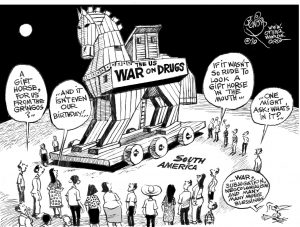Defending Natural Resources, Get Involved, International Meddling
CONFRAS Demands Review of CAFTA Following latest US Intervention
Agricultural Cooperatives feel our local economies threatened by the intrusion of the United States Government
Over 3 years, the agricultural cooperatives have managed to develop the technique of seed production of both corn and beans. This method produces high quality produce which has been certified with the technical and financial support of the Ministry of Agriculture.
This new production technique will reap many great benefits for El Salvador and especially for cooperatives and surrounding communities. In addition to massive job creation, it will also help corn producers gain seeds that guarantee production yields of 51 bushels per acre, the highest in Central America! However, all of our hard work is being threatened by the U.S. Government which is pressuring the Salvadoran Government to assure that the seed is not purchased by the poor and rural families who are struggling to escape poverty, and is instead only to be sold on a transnational level.
Since 2004, the government has been delivering packages to farmers and producers of basic grains which contain a 22-pound bag of seeds, and 1 quintal of fertilizer.
From 2004 through 2009, the packages served two purposes: the first was to promote and facilitate business to large importers, especially “Cristiani Burkard Seeds” and the transnational seed producer Monsanto. The second purpose was political and stated that in exchange for the package that these families would vote for ARENA.
With the start of the first leftist government headed by Mauricio Funes, the focus of the supply of agricultural packages changed. It was no longer a way to favor the commercial business of the bourgeoisie importer or transnational importing, nor for buying votes; but for the advancement of the poor agricultural families by increasing their chances of leaving poverty behind.
So the strategy was implemented to nationally produce our own corn seeds, and diminish the need to depend on imported seeds, guaranteeing consumers that the production is not contaminated with GM, and in turn the local economy became nourished through the generation of employment. At the same time, the Legislature approved Decree 198, which authorizes the government to buy seeds produced by cooperatives.
In each production cycle, cooperatives sell the government about 90,000 quintals of corn seeds that are distributed in 400,000 bags of 22 pounds. Its total revenue has generated approximately $11 million, which is nothing compared to sales made in 2013 by American companies in our country amounting to $4,186 million.
According to U.S. Ambassador Mari Carmen Aponte, the Salvadoran government violated CAFTA by buying national seeds; she has threatened to delay the signing of the second Millennium Challenge Corporation Funds [known in El Salvador as the Fomilenio 2] if the Salvadoran government does not allow U.S. companies to engage in a competitive bidding process for the sale of our seeds on a transnational level.
We Demand:
CONFRAS demands that Ambassador Aponte exemplify more respect for our national sovereignty. The ambassador should be ashamed to be fighting for a cause that is in fact completely insignificant to the U.S. economy, as is the sale of seeds. Moreover, the fact that she wants to take local business away from farmers and their families demonstrates the severity of her actions.
We hope that the incoming government, led by Salvador Sanchez Ceren, will take a firm stance on this issue and will not budge an inch to the blackmail of the U.S. embassy.
We demand a thorough review of the Free Trade Agreement with the United States, since according to many studies, the agreement violates our Constitution.
San Salvador, 28 May 2014
Stand in Solidarity with Salvadoran Farmers!
Sign the Petition Today!
Tell Secretary of State John Kerry that El Salvador’s family farmers come before transnationals like Monsanto.



